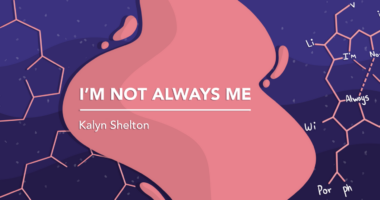Caring for the Caregiver: When Roles Are Reversed

My fiancé, Michael, is my caregiver. He tends to my needs during acute hepatic porphyria attacks, provides emotional support, and has steady energy that keeps me sane.
Last year when he became very ill, I had to take care of him. It was a “Freaky Friday” situation.
***
Mid-afternoon sun was streaming through the living room windows, shining natural light inside our 100-year-old bungalow. It was an unseasonably nice spring day, and normally we would be out in the yard or on a trail, except Michael told me earlier that morning his stomach hurt. He had been lying down, with his head facing the back of the couch, asleep for hours.
Initially assuming a simple digestion issue, I took the opportunity to plug into an audiobook and enjoy the solitude of a good, deep cleaning session. Avoiding the room where Michael was sleeping, I focused on my usual scoop of the kitchen, bathroom, bedroom, and dining room. Soon, my house smelled fresh and its surfaces gleamed. But my person still remained lying on the couch, exhausted and in pain.
I fretted over him, checking in anytime he made a movement. To feel useful, I unnecessarily refilled his water glass a few times. I went to the pharmacy and scoured the shelves for anything I could find with a claim to ease stomach symptoms.
As afternoon rolled into evening, I cancelled our swing dancing lessons and prepared dinner for one, as Michael wasn’t feeling up to eating. I was concerned something serious might be going on.
I was right.
When we finally went to the emergency room for Michael’s stomach pain and nausea, a doctor confirmed appendicitis pretty quickly. Michael would need emergency surgery. I was terrified.
Before he was wheeled out for the procedure, we found ourselves alone in a windowless intake room, surrounded by medical machinery. Clinging to his hand, I looked at the tubes going into his veins, heard the beeping of the monitors that reflected his vital signs, and searched his eyes for fear. He grinned weakly, and I returned a sheepish smile, because at the same moment, we realized we were living in a full-on role reversal.
***
Family caregiving is hard. Fortunately, my stint with it was short-lived.
Michael is now fully recovered, but he has to see me ill and in emergency room situations regularly. Like so many other family caregivers, Michael didn’t plan to serve in this role. One of our first dates was in the emergency room, and we were less than three months into our relationship when I was hospitalized for a seven-month porphyria attack.
If I had the choice, I would pick being hooked up and in a gown over sitting by the hospital bed, watching someone I love in pain and struggling. Every time.
November is National Family Caregivers Month, and I want to take a moment to recognize the unsung heroes in healthcare: family caregivers. In the U.S., an estimated one in three adults are caregivers, but it’s difficult to measure something as informal as family caregiving, and I suspect this number is higher.
There’s no handbook for informal, family caregiving, nor is there a paycheck. Depending on the needs or health of your loved one, there may not even be a support group that makes sense. Resources like the Caregiver Action Network and CaringBridge exist to support and connect family caregivers around the globe. They are great for general information, but I have found that patient-led connections between the caregivers of my porphyria friends have been the most helpful. A recent This Porphyria Life blog post paints a picture of caregiving for someone with hepatic porphyria.
For those of us living with a rare condition, how can we show a little extra gratitude for the people in our lives, who step up when we need a hand?
Please share your thoughts in the comments below.
***
Note: Porphyria News is strictly a news and information website about the disease. It does not provide medical advice, diagnosis, or treatment. This content is not intended to be a substitute for professional medical advice, diagnosis, or treatment. Always seek the advice of your physician or other qualified health provider with any questions you may have regarding a medical condition. Never disregard professional medical advice or delay in seeking it because of something you have read on this website. The opinions expressed in this column are not those of Porphyria News or its parent company, Bionews, and are intended to spark discussion about issues pertaining to porphyria.








Leave a comment
Fill in the required fields to post. Your email address will not be published.